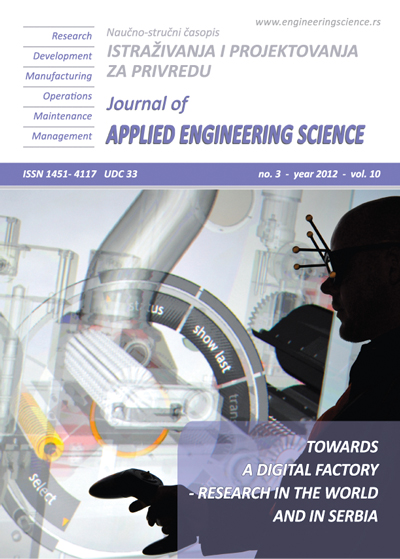FUZZY SYSTEMS TO SUPPORT INDUSTRIAL ENGINEERING MANAGEMENT
Abstract
This paper presents the potentialities of Fuzzy Set Theory to deal with complex, incomplete and/or vague information which is characteristic of some industrial engineering problems. Two systems that were developed to support the activities of industrial engineering managers are presented as examples of the use of this mathematical methodology.
Key words: Ergonomics, Work Related Musculoskeletal Disorders, Supply Chain, Resilience, Disturbances
References
Kahraman, C. (2006). Preface. In: Fuzzy Applications in Industrial Engineering, C. Kahraman (ed). Springer, New York
Kahraman, C., Gülbay, M. & Kabak, Ö. (2006). Applications of Fuzzy Sets in Industrial Engineering: A Topical Classification In: Fuzzy Applications in Industrial Engineering, C. Kahraman (ed). pp. 1-55. Springer, New York
Nunes, I. L. (2006). ERGO_X - The Model of a Fuzzy Expert System for Workstation Ergonomic Analysis. In: International Encyclopedia of Ergonomics and Human Factors, W. Karwowski (ed). pp. 3114-3121. CRC Press, ISBN 041530430X.
Nunes, I. L. (2009). FAST ERGO_X – a tool for ergonomic auditing and work-related musculoskeletal disorders prevention. WORK: A Journal of Prevention, Assessment, & Rehabilitation, 34(2): pp. 133-148.
Nunes, I. L. (2010). Handling Human-Centered Systems Uncertainty Using Fuzzy Logics – A Review. The Ergonomics Open Journal, 3: pp. 38-48.
Nunes, I. L. & Bush, P. M. (2012). Work-Related Musculoskeletal Disorders Assessment and Prevention. In: Ergonomics - A Systems Approach, I. L. Nunes (ed). pp. 1-30. InTech, 978-953-51-0601-2.
Nunes, I. L. & Cruz-Machado, V. (2012). A fuzzy expert system model to deal with supply chain disturbances. Int. J. Decision Sciences, Risk and Management, 4(1/2): pp. 127–151.
Nuens, I. L., Figueira, S. & Machado, V. C. (2011). Evaluation of a Supply Chain Performance Using a Fuzzy Decision Support System. Proceedings of The IEEE International Conference on Industrial Engineering and Engineering Management - IEEM2011Singapore, 6-9 Dec
Nunes, I. L. & Simões-Marques, M. (2012). Applications of Fuzzy Logic in Risk Assessment - The RA_X Case. In: Fuzzy Inference System – theory and applications, M. F. Azeem (ed). pp. 22-40. InTech, 978-953-51-0525-1.
Zadeh, L. A. (1965). Fuzzy sets. Information and Control, 8(3): pp. 338-353.
Zadeh, L. A. (1975a). The concept of a linguistic variable and its application to approximate reasoning-part I. Information Sciences, 8(3): pp. 199-249.
Zadeh, L. A. (1975b). The concept of a linguistic variable and its application to approximate reasoning-part II. Information Sciences, 8(4): pp. 301-357.
Zadeh, L. A. (1975c). The concept of a linguistic variable and its application to approximate reasoning-part III. Information Sciences, 9(1): pp. 43-80.
Zadeh, L. A. (1996). Fuzzy Logic = Computing with words. IEEE Transactions on Fuzzy Systems, 4(2): pp. 103-111.

